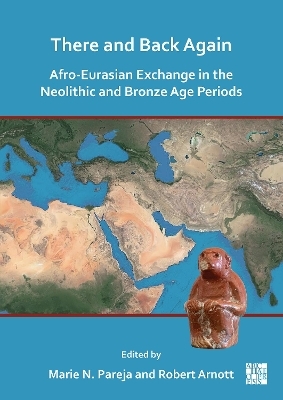
There and Back Again
Archaeopress Archaeology (Verlag)
978-1-80327-805-6 (ISBN)
The earliest contacts between the Aegean and the Indus were once thought to begin in the sixth century BCE, and yet there is now growing evidence of much earlier, indirect connections that extend into the third and fourth millennia BCE. There and Back Again evaluates the evidence for such contacts, particularly commodities such as tin and lapis lazuli, and discusses recently discovered objects, new methods of materials analysis techniques and topics, as well as iconographic investigation. Such studies clearly indicate the presence of indirect, or ‘trickle down’ contacts, where Mesopotamia functions as an intermediary between Africa and Europe in the west and Asia. In such a system, objects, iconography, and culture accumulate material and social value as they were exchanged through Mesopotamia and the Near East, to the Aegean and beyond. From the Early through Late Bronze Age, the Indus (and more broadly South Asia) remained critical to western regions for valuable, indispensable commodities destined for elites from Mesopotamia and other regions to the west. The volume’s case studies are complex and multifaceted, including but not limited to linguistics, iconography, paleobotany, archaeology, ancient disease and medicine, as well as scientific, materials, and technological analysis. As such, this collection of 11 papers constitutes the first of a series that seek to address a lingering lacuna in prehistoric studies: multi-disciplinary case-studies of Afro-Eurasian exchange.
Dr. Marie N. Pareja is an archaeologist and art historian who specialises in Indus-Aegean Prehistory and lime plaster (frescoes). She is the executive director of the Aegean Bronze Age Study Initiative (ABASI), serves as consulting scholar for the University of Pennsylvania Museum of Anthropology and Archaeology, assistant professor at Marshall University, and works for the Stelida Naxos Archaeological Project, Mochlos Archaeological Project, and Sissi Archaeological Project. Professor Robert Arnott† was a Fellow of Green Templeton College in the University of Oxford. An archaeologist who specialised in ancient disease and medicine, he authored or edited five books and over seventy, mostly single-authored, papers. Recently, his interest turned to India and his books and papers centred on health, healing and disease in the Indus Civilisation, 2600-1900 BCE, and relations between the Indus and the Aegean in the Bronze Age. He was a Fellow of the Royal Asiatic Society.
Foreword: Old Assumptions Die Hard – Shereen Ratnagar
Introduction – Marie Nicole Pareja, Robert Arnott
Chapter 1: Crossing Continents: between the Indus and the Aegean in prehistory – Robert Arnott
Chapter 2: Indus-Aegean Interaction in the 3rd millennium BC – Geoffrey E. Ludvik, J. Mark Kenoyer
Chapter 3: Junction Points: New Evidence for Long-Distance Trade between Minoan Crete and the East – Susan C. Ferrence, Alessandra Giumlia-Mair, Philip P. Betancourt, Metaxia Tsipopoulou
Chapter 4: Fierce Femmes: On the Syncretic Nature of the Bronze Age Divine in Afro-Eurasia – Marie N. Pareja
Chapter 5: The Iconography of Game Animals in Afro-Eurasia and Disease – Amanda N. Porter
Chapter 6: The ancient views of India and Ethiopia as evidence for intercultural contacts between Bronze Age India and the Mediterranean – Asterios-Evangelos Kechagias
Chapter 7: Ḫumbaba the elephant? On eastern elements in the Standard Babylonian Gilgameš epic – Sureshkumar Muthukumaran
Chapter 8: Babylonia abroad in the Kassite period – Tim Clayden
Chapter 9: Relations between the Indus and the Aegean in the Bronze Age: Assessing the limited
linguistic evidence – Stephen P. B. Durnford
| Erscheinungsdatum | 15.10.2024 |
|---|---|
| Sprache | englisch |
| Maße | 203 x 290 mm |
| Gewicht | 290 g |
| Themenwelt | Geisteswissenschaften ► Archäologie |
| Geschichte ► Allgemeine Geschichte ► Vor- und Frühgeschichte | |
| ISBN-10 | 1-80327-805-6 / 1803278056 |
| ISBN-13 | 978-1-80327-805-6 / 9781803278056 |
| Zustand | Neuware |
| Informationen gemäß Produktsicherheitsverordnung (GPSR) | |
| Haben Sie eine Frage zum Produkt? |
aus dem Bereich


